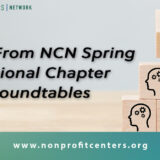I am intrigued by Andrew Stern’s article in the latest Stanford Social Innovation Review titled, No Exit The Case for Nonprofit Holding Companies. It dovetails with our upcoming event in Philadelphia, Streamlining Social Good on April 28th. Stern’s premise is that nonprofits often hit a wall after 5-10 years when fundraising becomes more difficult and leadership transitions abound. In the for-profit sector there is an efficient system for harnessing the value in such an organization – companies are acquired by larger companies and derive benefits from the additional resources these strategic mergers offer. They don’t have to get to scale on their own, as is presumed in the nonprofit sector: Grow, Change or Die! Nonprofits don’t have a similar way to pivot and still retain their value.

There’s a lot of change brewing in the commercial real estate (CRE) world. From how we work to what a new generation of workers want from their workplace, these shifts are impacting the design and offerings of office space. Some of these trends are maturing (like the open plan) and new ones are coming on the scene (like hackable workspaces). What’s exciting is that much of the new thinking is aligned with the values that are already important to those of us who own and operate social purpose real estate and easily builds on our efforts to develop robust communities while providing affordable, quality workspace.
In addition to our work with shared space, we at NCN are also interested in the broader field of social purpose real estate. We define social purpose real estate as any real estate asset that is used for a mission greater than maximizing profits, which can range from public parks to libraries, from museums to affordable housing projects. One of the most overlooked social purpose real estate is affordable commercial space, the space necessary for nonprofits to operate in a community. In some cities, the market creates enough affordable spaces that this isn’t a big issue, but in other cities, (most notably San Francisco), nonprofits are being displaced or evicted when they can’t keep up with the going rates. Here are four ways that cities have stepped in to support their nonprofit sectors...

The role of a board in governing any organization cannot be overestimated. How the members of your board perform can make all the difference. In my experience, one of the most important components in creating and sustaining a healthy well-run co-work space is not only that board members understand what is expected of them in relation to the governance of the organization, but that they are also fully prepared to embrace their role.
Two great shared space centers have come across my desk recently. We hear about new centers all the time, but these struck me because of their unique missions: Startup Boat & Women's Building
I can’t wait for April. NCN has two exciting events in store. On April 27th we will be hosting our advanced training, called Energize: High Impact Shared Spaces in Philadelphia. This is a great opportunity for center operators to learn about leading issues in shared space and network with their peers.
I often get calls from people thinking about starting a nonprofit center in their community. While we believe in the power of shared space, there are several things you should consider before you break ground.
It’s All Business was our theme in January. Our webinar on January 21st with Laura Kozelouzek of Quest Workspaces helped us understand the way for-profit operators view shared space. Executive suites and business centers are the precursors in many ways of mission-driven shared spaces and coworking spaces. We need to learn more about what drives their success and what pitfalls they’ve discovered so we don’t repeat them.
Did you know that 98% of the nonprofit center have a goal of increasing collaboration among their resident partners? The opportunities presented by working together with your neighbors in shared space are incalculable, but often managers don’t feel like their community is living up to their expectations. To help get groups moving in the right direction, we’ve developed a half-day session called a “Collaboration Kick-Off” to help clarify a group’s goals around collaboration and spark ideas of potential connections.
Many nonprofit centers I’ve visited do a lot to reduce their carbon footprint, from putting in super-efficient HVAC systems and bio-walls to replacing your trash-can with a recycling bin. Since approximately 20% of office waste is organic matter, the next step for many groups is to start an office composting program. Both centers I’ve worked out of, the Thoreau Center for Sustainability in San Francisco and The Alliance Center in Denver, have run successful composting programs for years. Here are some tips your space.














